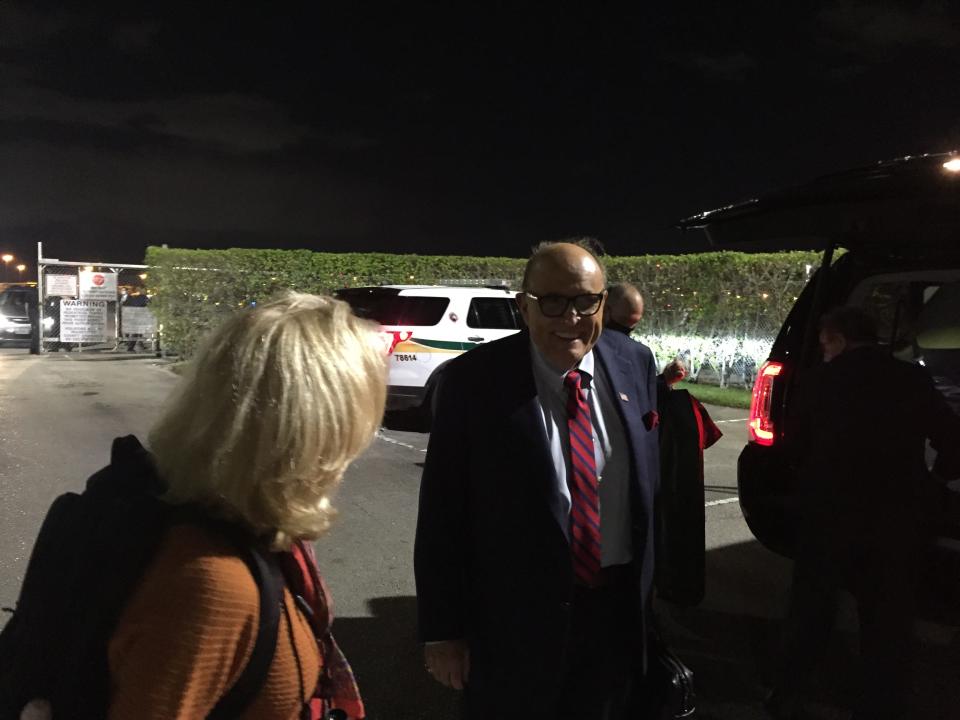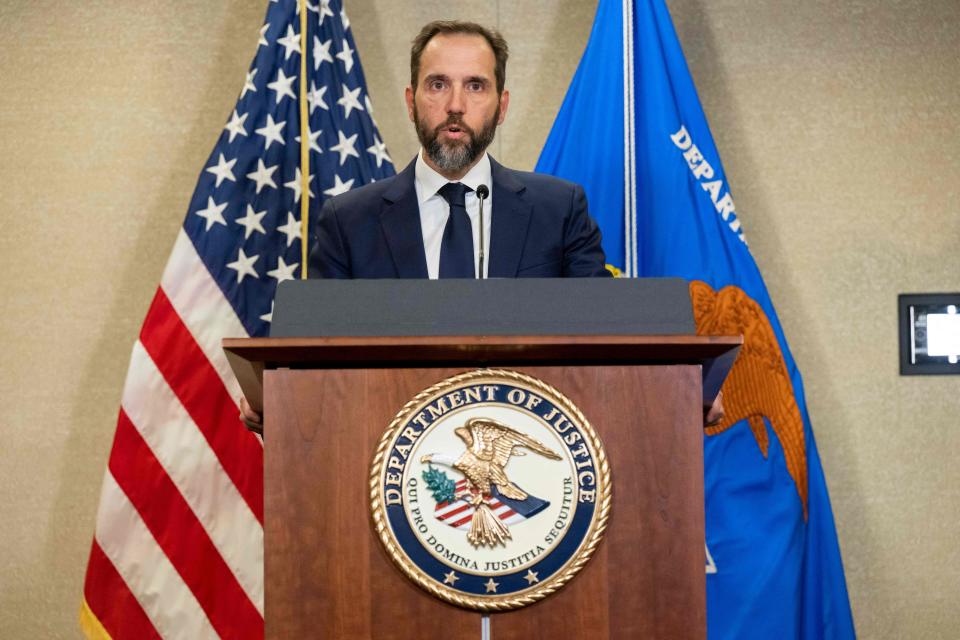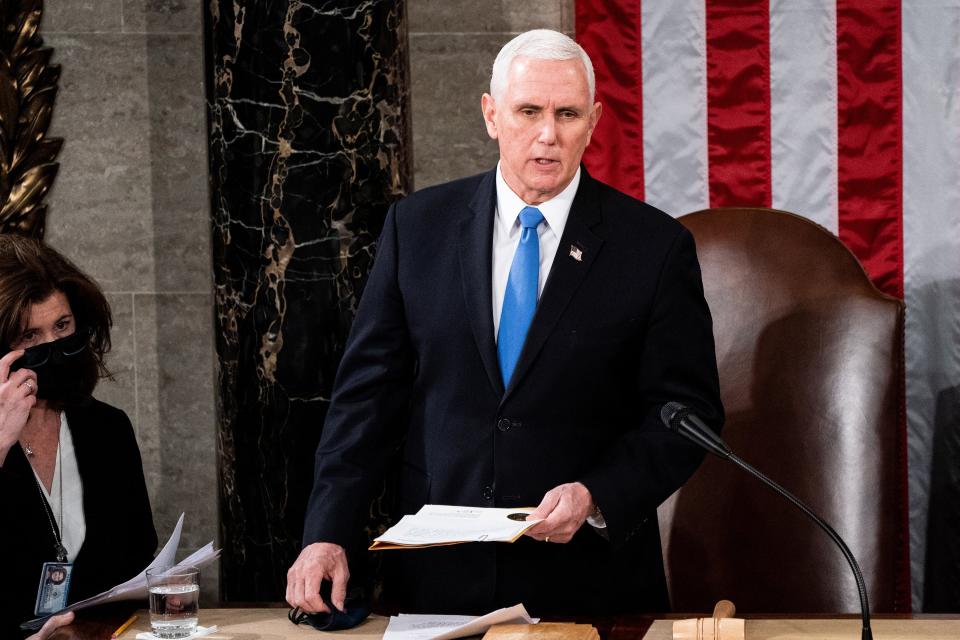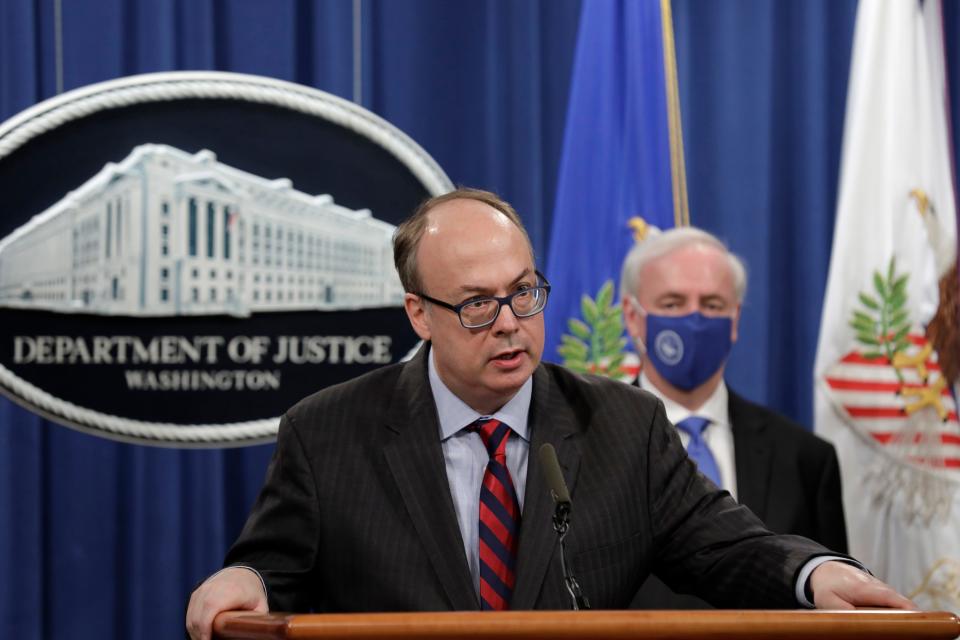Vote-changing satellites and Justice Dept. pressure campaign: How Trump spent Christmas 2020
- Oops!Something went wrong.Please try again later.
- Oops!Something went wrong.Please try again later.
- Oops!Something went wrong.Please try again later.
- Oops!Something went wrong.Please try again later.
- Oops!Something went wrong.Please try again later.
- Oops!Something went wrong.Please try again later.
- Oops!Something went wrong.Please try again later.
A trial on the 45-page indictment of the 45th president — which a federal judge has now scheduled for March 4 of 2024 — may yet reveal more details about then-President Donald Trump's odd 2020 Christmas stay at Mar-a-Lago.
Trump uncharacteristically stayed out of sight during his truncated nine-day stay at his Palm Beach club, and then abruptly departed midmorning Dec. 31, skipping his annual New Year's Eve gala that evening.
Last year's televised hearings by a congressional panel investigating the Jan. 6, 2021, attack on the U.S. Capitol first pulled back the curtain on Trump's atypical year-end holiday at Mar-a-Lago. More details then became available in the 800-plus page report issued by the committee in December. Then the four-count indictment issued Aug. 2 against Trump parted the curtains even wider, revealing an awkward Christmas Day phone call and more behind-the-scenes skullduggery.
Now, the pre-trial discovery in the seven months, not to mention the scheduled start of trial a day before the pivotal Super Tuesday primaries, may yield more revelations.
Here is a timeline of what congressional investigators say they learned and federal special counsel Jack Smith alleges happened at Mar-a-Lago during that weird week in Palm Beach.
Trump indicted: Former president becomes latest Florida man charged with leading Jan. 6 attack
December 23 — Just what did Rudy Giuliani mean?
Trump and then-first lady Melania Trump arrived at Palm Beach International Airport after sunset aboard Air Force One. Departing the PBIA tarmac, Palm Beach Post reporters encountered Trump attorney and confidant Rudy Giuliani. Giuliani told The Post that other "challenges" were in the works during that Christmas holiday visit, but offered no details.
What did he mean? The indictment offers a clue, perhaps.
Earlier that day, White House Chief of Staff Mark Meadows, the indictment reported, "personally observed the signature verification process at the Cobb County Civic Center in Georgia and notified Trump that state election officials "were conducting themselves in an exemplary fashion and would find (election fraud) if it existed."
But, the document stated, Trump apparently refused to accept that and instead tweeted that Georgia officials in charge of the signature verification process were trying to hide evidence of election fraud and were "terrible people!"
Meanwhile, the co-conspirator 2 cited in the indictment, who has been identified in news reports as attorney John Eastman, allegedly circulated a two-page memorandum outlining the plan for Vice President Mike Pence "to unlawfully declare the Defendant the certified winner of the presidential election."

In that memorandum, the indictment adds, co-conspirator 2 claimed that "seven states had transmitted two slates of electors and proposed that the Vice President announce that because of the ongoing disputes in the 7 States, there are no electors that can be deemed validly appointed in those States."
The indictment alleges that just two months before, on Oct. 11, co-conspirator 2 "had taken the opposite position" by declaring in writing that neither the Constitution nor the federal Electoral Count Act "provided the Vice President discretion in the counting of electoral votes, or permitted him to make the determination on his own."

December 24 — More like Festivus than Christmas
One of the strangest twists in that year's Trump Christmas was the first couple's decision to skip Christmas Eve services. A longtime Trump tradition was to attend midnight services at Bethesda-by-the-Sea Episcopal Church in Palm Beach. In 2019, the Trumps worshipped at a Christian evangelical church in West Palm Beach.
But in 2020, they skipped Christmas Eve services altogether.
Trump was vocal that day on Twitter, however. In the late afternoon, he railed in an all-capital letters post that:
"VOTER FRAUD IS NOT A CONSPIRACY THEORY, IT IS A FACT!!!"
He also tore into Republican elected officials who he felt were not backing his unfounded claims of election fraud: "I saved at least 8 Republican Senators, including Mitch (McConnell), from losing in the last Rigged (for President) Election. Now they (almost all) sit back and watch me fight against a crooked and vicious foe, the Radical Left Democrats. I will NEVER FORGET!"
More on Trump at Mar-a-Lago: Trump post on Jan. 6 investigation renews questions about what took place in Palm Beach
December 25 — A foreboding Christmas Eve phone call
On Christmas Day, Trump again stayed out of sight, bypassing yet another tradition: conversations with U.S. military personnel stationed across the globe. But Trump did take a phone call from Pence, who phoned into Mar-a-Lago to wish Trump a Merry Christmas. It was Trump, of course, who had made "Merry Christmas" greetings a political-cultural issue, saying after his 2016 election that the country would again freely express the season's greeting.
But the indictment said the expression of holiday goodwill ended quickly as Trump "quickly turned the conversation to January 6 and his request that the Vice President reject electoral votes that day. The Vice President pushed back, telling the Defendant, as the Vice President already had said in previous conversations, 'You know I don't think I have the authority to change the outcome.' "
December 26 — A presidential veto and a 'lie'

There was no news conference the day after Christmas, but Trump did make a consequential decision in vetoing the $740 billion defense spending legislation. By way of Twitter, Trump claimed the "bill is a gift to China, Russia & Big Tech. It fails to terminate the internationally dangerous Section 230," a technology provision, and "won’t allow us to bring our troops back home (where they belong), renames & destroys our forts & National Monuments, & makes 5G almost impossible!"
Behind the scenes, though, the indictment spotlighted the emergence of co-conspirator 4, who news agencies have identified as Jeffrey Clark, who Trump appointed to the Justice Department and was serving as acting head of the Justice Department’s Civil Division. The indictment claims co-conspirator 4 "lied" to Acting AttorneyGeneral Jeffrey Rosen about the circumstances of his earlier meeting with Trump at the White House, "falsely claiming that the meeting had been unplanned."
The nature of that meeting would be revealed by the Jan. 6 committee probe as the reason Trump would end his holiday stay at Mar-a-Lago earlier than scheduled.
Trump's 2020 Christmas in Palm Beach: Former president focused on 'last-ditch' effort to overturn election results
December 27 — Another phone call that would get Trump in trouble
There was Ukraine. There was Georgia. And then there was this Dec. 27 call, when Trump spoke with Rosen and Acting Deputy Attorney General Richard Donoghue. The two testified during the Jan. 6 hearings that Trump peppered them with a previously discredited "arsenal of allegations" about election fraud, which they refuted.
The indictment states those unfounded allegations included accusations of voter fraud taking place at State Farm Arena in Atlanta, said to be the state's largest-ever voting precinct. Another baseless allegation, the indictment revealed, was a "specific fraud claim that there had been more votes than voters in Wisconsin."
Trump also name-dropped co-conspirator 4, said to have been Clark, saying: "People tell me he is great I should put him" in charge of election fraud issues.
Donoghue told the Jan. 6 panel that he and Rosen also debunked what they called an erroneous review of a Michigan County's assessment of ballot counting, as well as shooting down a discredited report by a truck driver who said he had driven a tractor-trailer full of ballots to Pennsylvania from New York.
"We had concluded based on actual investigations, actual witness interviews, actual reviews of documents, that these allegations simply had no merit," Donoghue said.
Trump had no interest in those findings, according to Donoghue.
"Just say the election was corrupt and leave the rest to me and Republican congressmen," Donoghue quoted Trump as saying on the phone from South Florida.
December 28 — More "dramatic claims" about election wrongdoings but still no evidence
In a tweet, Trump falsely claimed that "there were 205,000 more votes than there were voters."

But the more pressing maneuvering was in Washington, where the indictment said co-conspirator 4, said to be Clark, sent a draft letter to Rosen and Donoghue that he wanted them to sign and forward to Georgia officials, as well as issuing similar versions of the letter to elected officials in other states.
The indictment alleges "the proposed letter contained numerous knowingly false claims about the election and the Justice Department." Those baseless allegations include that Justice Department officials had "identified significant concerns that may have impacted the outcome of the election in multiple States."
The letter, the indictment stated, "sought to advance the Defendant's fraudulent elector plan by using the authority of the Justice Department to falsely present the fraudulent electors as a valid alternative to the legitimate electors."
Rosen rejected the idea, the indictment said, writing that: "Despite dramatic claims to the contrary, we have not seen the type of fraud that calls into question the reported (and certified ) results of the election."
December 29 — Cue the satellite that changes votes from space
The following day, on Dec. 29, the Justice officials said they were presented with yet another dubious and half-baked scheme. This time, they said they were told to file a lawsuit at the U.S. Supreme Court that was drafted by non-Justice Department lawyers.
They refused.
"It was a meritless lawsuit," said Steven Engel, another top Justice Department official who testified at the Jan. 6 panel hearing a year ago.
Trump was also in contact with Pence, and the indictment this time said he sought to deceive the vice president, saying that the Justice Department was "finding major infractions."
Then things got weird.
Donoghue told the Jan. 6 committee that an even more bizarre allegation would follow. Specifically, that a contractor for the Italian defense ministry, working with British intelligence and the CIA, had uploaded software to a satellite that then had changed election-machine vote counts from Trump to Biden.
It was "pure insanity" and "patently absurd," Donoghue testified.
December 30 — 18 tweets including an ominous one
Trump was an avid Tweeter, and on this day he fired off 18 social-media missives.
He called the handling of election counts in Georgia by Gov. Brian Kemp and others "stupid," said the Wall Street Journal editorial board was "very boring & incoherent," gleefully heralded that he had toppled former President Barack Obama from the "top spot" as the year's "most Admired Man" — all interspersed with more unfounded allegations of election fraud.
But it was the 13th tweet that he wrote all in capital letters for emphasis: "JANUARY SIXTH, SEE YOU IN DC!"
December 31 — A hasty departure from Mar-a-Lago
It was abruptly announced that morning that Trump would leave Palm Beach earlier than expected, missing his annual New Year's Eve gala. No explanation was given for the change in travel plans.
The Jan. 6 hearings shed light on why, with Rosen and Donoghue saying a "desperate" Trump rushed back early from Mar-a-Lago that day for an "emergency meeting" at the White House, said committee member and former U.S. Rep. Adam Kinzinger, R-Illinois.
What followed, the committee said citing witness testimony, was a brazen and outlandish scheme to fire Rosen and replace him with Clark, the lower-level Justice official, who they said was willing to do Trump's bidding. That plan failed when Rosen and Clark said the proposed firing would be followed by mass resignations at Justice, sparking chaos and damaging the department's credibility.
The indictment added another detail to the day's events. It alleges Trump signed "a verification affirming false election fraud allegations made on his behalf in a lawsuit filed in his name against" Kemp, the Georgia governor.
The indictment added: "In advance of the filing, co-conspirator 2 who was advising the Defendant on the lawsuitacknowledged in an email that he and the Defendant had, since signing a previous verification, been made aware that some of the allegations (and evidence proffered by the experts) has been inaccurate and that signing a new affirmation with that knowledge (and incorporation by reference) would not be accurate."
Antonio Fins is a politics and business editor at the Palm Beach Post, part of the USA TODAY Florida Network. You can reach him at afins@pbpost.com. Help support our journalism. Subscribe today.
This article originally appeared on Palm Beach Post: Trump indictment: March 4 trial may detail 2020 Mar-a-Lago Christmas

